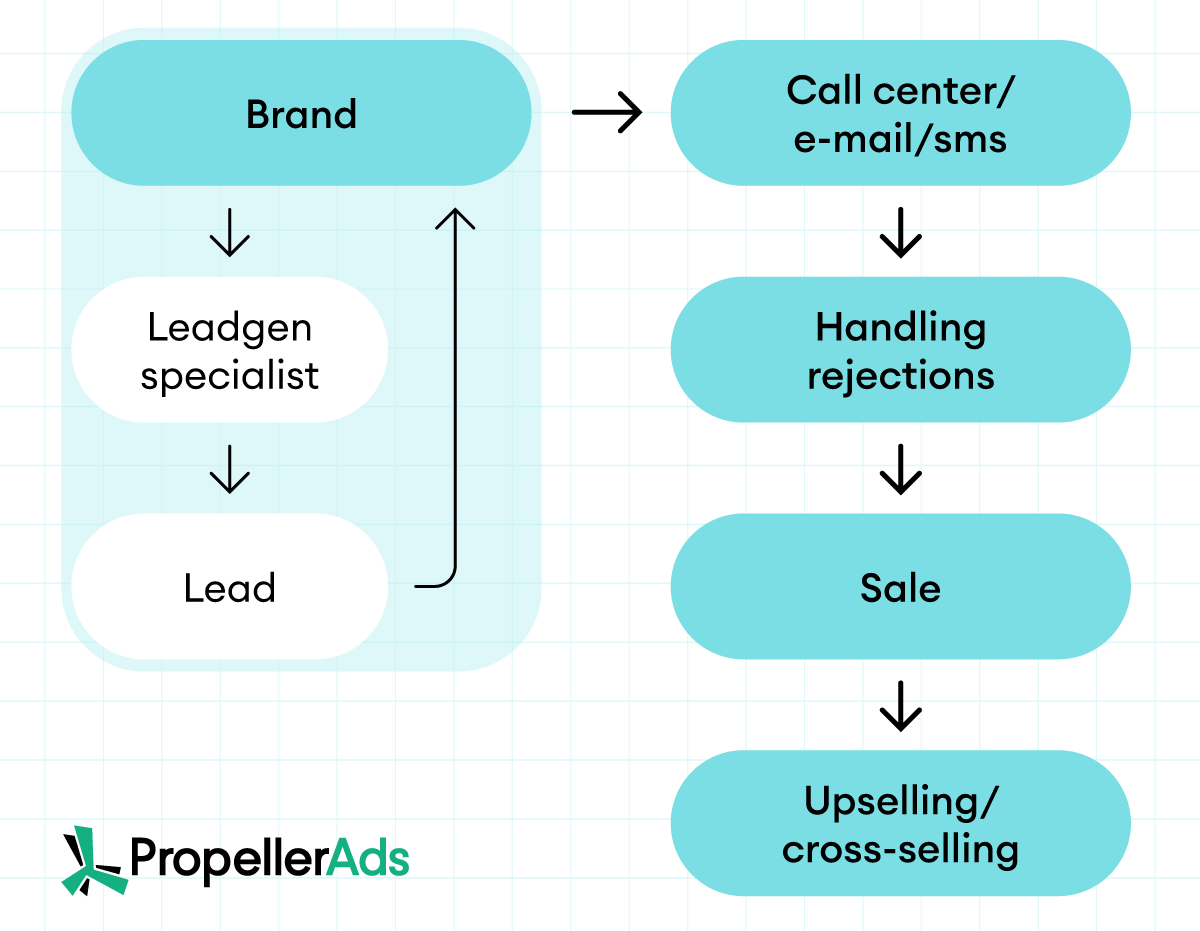Lead Generation vs. Affiliate Marketing: What is The Difference?

This post is also available in:
PT
ES
Imagine a company that sells hamster DNA kits and looks for customers who are curious about their hamster’s ancestry.
(Maybe this sounds a bit weird, but that’s a genuine request, by the way).
So is it a job for an affiliate marketing or Leadgen specialist?
And, wait, are they different at all?
Today, with the help of our media buyers, we will explain the difference between affiliate marketing and Leadgen — and teach you how to combine both.
First, What Do We Mean By a Lead Here?
In the world of digital marketing, a lead is a contact of a potential customer — someone who is very likely to convert.
The simplest lead can include a name and an email — but some brands are looking for more detailed info, like a phone number, company info, etc.
So, basically, if the company with the DNA tests we mentioned above gets the phone number of some avid hamster owner, this will be their lead.
What is Lead Generation?
Leadgen is the process of identifying and attracting potential customers — e.g., leads — and building relationships with them to motivate them to purchase goods and services or make another conversion.
For example, an insurance company wants to sell its new product to car owners. This product might be pretty expensive, and the sales process can take some time. So, a company receives contacts of its prospects — leads — and begins working with them by explaining all the product benefits, working with rejections, and so on.
Overall, lead generation strategy implies creating interest in a brand among people who will most likely need its services or products. And there are many ways how companies do it:
- Some use lead generation software like OptinMonster or LeadPages. Overall, such services help create various lead generation tools: popup forms, quizzes, chatbots, and interactive landing pages.
- SEO and content marketing are also considered as one of the Leadgen strategies.
- Many brands outsource Leadgen to third parties. And sometimes — to affiliate marketers, too.
Whatever the lead generation strategy is, much work remains ahead after a business receives a lead. A third-party specialist or a Leadgen service that helped bring a lead doesn’t have any more responsibility for the further development of the sales funnel.
This is how it looks in the scheme:

As you see, a person/company responsible for the lead generation process takes care of only a tiny part of the whole sales funnel.
And what is Affiliate Marketing?
In a nutshell, affiliate marketing is where a business outsources promoting its offers to a third-party (affiliate marketer) — and pays a commission for a particular result.
Of course, there’s more involved — read in our ultimate affiliate marketing guide!
Overall, the point of affiliate marketing is to bring estimated outcomes. They can be simply clicks on an ad, installed apps, website registrations, first deposits made — and many more.
For example, the same insurance company might want to promote its special travel insurance offer — and pay affiliate marketers for every user who purchases this product. As travel insurance is a cheaper and overall simpler product than the one for cars, it’s easier to sell without a long funnel and close contact with a prospect.
So it works like this:

And — a plot twist of this whole article — leads can also be the point of an affiliate marketing campaign. Remember the CPL conversion, which is precisely Cost-Per-Lead? Yes, this is what we call affiliate lead generation.
So, basically, affiliate marketing is a broader definition than lead generation — but they can be perfectly combined.
How exactly? Let’s see.
Leadgen Affiliate Marketing Offers
In fact, there is a particular direction in the whole affiliate marketing world that you call Leadgen.
Yes, this is a task for affiliate marketers to collect leads and get paid for each. Together with Serge Abramov, PropellerAds media buyer, we separated two types of Leadgen offers.
Type 1: Classical Leadgen
This niche involves pretty expensive products — so brands prefer using affiliate marketing for leads here because such sales involve a long funnel.
Serge: While some of such offers imply a customer is almost willing to buy — this works for Nutra, for example — most of them, like Real Estate offers, involve a big and lengthy sales process through managers, call centers, etc. The obvious advantage for an affiliate marketer is that the final result of the funnel — sale — is not their responsibility.
Here are the top popular offer types in the so-called classic Leadgen niche:
- Insurance services

- Solar panels for saving energy:

- Real estate offers

Note from PropellerAds: Such Leadgen offers are pretty expensive for media buyers — and require much experience with building working bundles, budget planning, and creating funnels.
Type 2: Leadgen Surveys
Another option we already mentioned in our blog is Survey Offers.
They are also called Leadgen because the flow looks the following way:
- A user fills out a survey on a particular topic, say, iGaming.
- When the survey is over, a user is redirected to a relevant iGaming offer.
The point of such Leadgen offers is to both boost conversions and generate leads for the brand’s future sales or retargeting campaigns.
And here are a couple of such offers you can try out right now:
Affiliate Marketing vs. Leadgen: Sum it Up
So, what did we learn today? Let’s sum it all up with the help of Svetoslav, Sublime Revenue owner:
Affiliate marketing is more about generating results, which brands can’t afford to do on their own or by outsourcing. Leadgen is more about boosting brand awareness and evoking the interest of potential customers — especially for new services and products.
Here is a brief table that will also help to spell it out.
| Affiliate Marketing | Lead Generation |
| The main aim is to increase sales, mainly focuses on immediate results | The main aim is to collect contact details and build a sales funnel, a long-term game |
| Implies the offer promotion and further conversions with the help of a third-party (affiliate marketer) | Is a single step of a long-term sales funnel and best fits high-priced offers |
| Can involve various types of offers with easier or harder conversions | Involves only Cost-per-Lead conversion |
| In many cases, an affiliate marketer is responsible for the result: app installs, views, conversions | Requires only contact details of the potential customer; the rest of the job is the responsibility of the offer owner |
| The offer owner controls methods of attracting users | The Leadgen specialist also needs to promote the offer in a brand-safe way |
And, a quick reminder from us: Leadgen and affiliate marketing is a combination of both that you can try right away.




